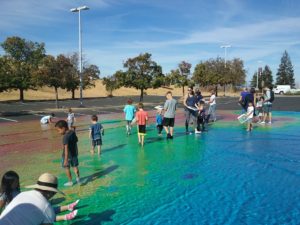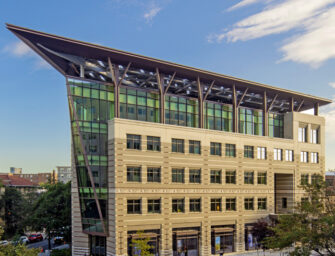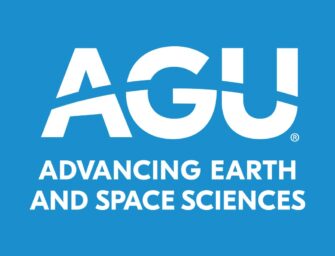Seven New Awardees of the Celebrate 100 Grants

Mars on the Mall
With the start of 2019, AGU’s Centennial is now in full swing. And what better way to celebrate than by having you, our members, create and plan events across the globe. That is why I am so pleased to announce the next set of Celebrate 100 Grants that enable our members and partners to share the wonder and excitement of Earth and space science and how it benefits communities and society.
Open to AGU members and non-members, the Celebrate 100 Grants, a cornerstone of AGU’s Centennial, awards small (less than $1000) and major awards (up to $10,000) to “support projects demonstrating innovation, collaboration, impact and sustainability in promoting the value of Earth and space science, primarily to the public.” After announcing the first two grantees in November of last year, I’m proud to celebrate our seven newest winners of these grants, which collectively exemplify the power and global value of our science.
Small Grant Winners
1) Sustainability Science, Technology, Engineering, Art, and Mathematics (STEAM) Fair—Nicola Weiss, STEM Education Advocate, California, USA
In March 2019, we are hosting our 3rd Annual Sustainable STEAM Fair. Our team decided that the time had come to bring a STEAM Fair to the community in order to educate families, students, and parents about the roles STEAM has played in their lives and how STEAM Education can impact their future studies. We wanted to focus be on the environment and sustainability which everybody can easily be a part of without a lot of expense and which has a long lasting impact. As we educate the students on campuses and in classes, we are also sharing this knowledge with the community and showcasing student efforts while doing so.
2) 2019 AMOS Art Competition: My Favourite Weather—Jeanette Dargaville, Executive Officer, Australian Meteorological and Oceanographic Society, Melbourne, Australia
The Australian Meteorological & Oceanographic Society (AMOS) is a national not-for-profit organisation that provides support for and fosters interest in the climate, weather, water, and oceans sciences. Each year we hold a national art competition for students from pre-school through grade 9. A different theme each year guides student exploration. In 2019, it is “My Favourite Weather.” Australian students from preschool to grade 9 are invited to submit an artwork that illustrates how their favourite weather affects them. While the focus is on creativity, the artists are encouraged to reflect a real-life understanding of how weather influences daily life. The competition is being promoted directly to schools, targeting the following age categories: preschool, primary, k-2 primary, 3-6 secondary, and 7-9.
Major Grant Winners
1) Climate Warrior Collective—Shayna Skolnik, Founder of The Climate Warrior Collective, Maryland, USA
Using a series of immersive virtual reality (VR) 360 video shorts, Climate Warrior Collective aims to help people understand the effects of climate change, how these effects are corroborated by data, and to urge people to think about how we can adapt to our changing world. By linking climate data to 360 video footage, this VR series helps viewers better understand that severe weather events. The second component to our proposal is a Climate Warrior Collective fashion show. Through a partnership with the fashion designer, Vivienne Westwood, we would like to show how art, technology, science, and technology can merge to inspire others to have a climate-first mentality. The products are sustainably produced and the show itself will feature area STEM high school and college students to model the clothing and bags.
2) Mars on the Mall—Jonathon Hill, Mars Mission Planner and Graduate Student, Arizona State University, Arizona, USA
The 2001 Mars Odyssey spacecraft’s THEMIS camera has acquired images of Mars for more than 16 years. Twenty-four thousand high-quality images have been compiled into a global mosaic and printed at full resolution on a walkable basketball court-size vinyl mat. The goal will be to display this giant map of Mars on the National Mall outside the Smithsonian Air and Space Museum in order to spur interest and support for planetary science among policy makers and the general public. We will schedule the event for dates in spring 2019 when Congress is in session and also include a weekend so that a large number of visitors to the museum can explore the map. The desired outcome is that AGU and Arizona State University will be viewed as valuable, knowledgeable partners in both planetary science and in distributing the knowledge we gain from planetary missions to the public.
3) Virtual Reality Exploration of Coastal Flooding—Tina Korani, Assistant Professor of Media Design, San Jose State University, California, USA
We are visualizing an historical flood in a photorealistic environment using a virtual reality (VR) headset as well as its projected level with different level of sea level rise. Our pilot study will be Balboa Island of Newport Beach, a coastal city in South California, that has experienced nuisance floodings regularly as well as a major centennial flood in 2005. Because of the recurrent nuisance flood and recent centennial flood still in people memory, Balboa Island is a perfect location for testing the impact of VR technology of coastal flooding awareness in a changing climate. By showing that sea level rise is the main contributor to flood in Balboa, we will highlight the importance of Earth science research to estimate sea level rise accurately, and invest to build the appropriate infrastructures.
4) Strategies for Climate Resilience: Puerto Rico—Erin Leckey, Education and Outreach Associate and Scientist, University of Boulder, Colorado, USA
This project engages teachers and community members in Arecibo, Puerto Rico through a workshop on climate science which grows out of a need for climate science activities identified during a student program held last summer. Our local partners work with teachers and organize community events that explore locally-relevant science topics. Our workshop in January 2019 is a two-day event that includes both climate science and hazard preparation activities. All teacher participants receive professional development credit, a requirement for recertification, and tools to help them implement activities in their classes. The community event following the workshop will include a disaster-scenario game, a screening of the student films made in our summer workshop, and a facilitated discussion around climate impacts.
5) Arctic Futures: Science & Policy Collaborations—Brendan Kelly, Professor of Marine Biology, University of Alaska Fairbanks, Alaska, USA
The Study of Environmental Arctic Change (SEARCH) and its partners are designing a novel conference to foster collaborative relationships between Arctic scientists, indigenous knowledge holders, and policy makers. The conference will be held on 4-6 September 2019 at the National Academy of Sciences in Washington, DC. The conference will highlight the shared value of informing policy with science and call for improved communications. Scientists need to understand the cultures and challenges of policy makers, and policy makers need to help scientists make their research more actionable. SEARCH is a multi-disciplinary, multi-institutional program synthesizing understanding of the changing Arctic and making that understanding readily accessible to policy makers.
Centennial celebrates the 100 years of the community and science that AGU collectively represents. It is an opportunity for the diverse voices in the Earth and space science community to celebrate all that the community has accomplished in the last 100 years and an opportunity to set the stage for the next transformational era of Earth and space science. There’s plenty of time for you to apply for a Celebrate 100 grant to help you participate in AGU’s Centennial, to help amplify the accomplishments and stories of the last 100 years of Earth and space science, to build lasting connections between the research community and society, and to inspire the world to see how Earth and space science can create a more sustainable future for us all.




There are no comments
Add yours